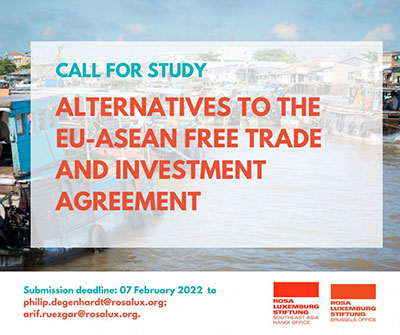The Rosa-Luxemburg-Foundation, a member organisation of transform! europe, has issued a call on the causes and rationale behind the efforts for an interregional free trade agreement.
The European Union intends to conclude a new generation of free trade agreements in order to increase its global competitiveness. In doing so, the EU generally prioritizes rules-based multilateral trade agreements. Since the increasing liberalization and deregulation efforts within the framework of the multilateral trade policy of the World Trade Organization (WTO) were interrupted, the EU, contrary to its earlier rather restrained position, has increasingly relied on bilateral free trade agreements in recent years. The EU signed a free trade and investment protection agreement with Singapore at the ASEM summit in October 2018. The EU Parliament approved both agreements in February 2019. With Vietnam, a free trade and investment protection agreement was signed in Hanoi in June 2019. While the FTA entered into force in August 2020, the latter, on the other hand, has yet to be ratified by EU member states. Negotiations on a joint FTA with Malaysia started in October 2010, but have been on hold since 2012. The EU is seeking to resume negotiations. Negotiations have also been ongoing with other countries such as Indonesia and the Philippines since 2016.
Despite these numerous bilateral trade agreements, the overarching goal remains the conclusion of interregional free trade and investment agreements. On 1 December 2020, the EU and ASEAN countries agreed at the ASEAN-EU Ministerial Meeting to further strengthen relations. To strengthen their economic (and security) cooperation, both parties have committed to holding regular summits.
The EU’s new generation of FTAs are wide-ranging, covering tariff and protectionist barriers such as tariffs and export subsidies, but also include provisions to reduce non-tariff barriers (quantitative restrictions, technical barriers or government procurement), increase reciprocal investment and trade in services (digital trade, telecom services, financial services, etc.).
Aims of the study
- To explore the causes and rationale behind the efforts for an interregional free trade agreement.
- The study provides a statistical overview of trade between the two regions and of European foreign direct investment in Southeast Asia.
- An assessment of the future of economic (and political) relations between the EU and ASEAN.
- Left vision or concept of an interregional trade agreement between the EU and ASEAN that is equitable and takes into account the demands of a socio-ecological transformation.
How to apply
Please send applications – with the reference “Application EU-ASEAN Trade Agreement” – in the subject line – by e-mail by 07 February 2022 to philip.degenhardt(at)rosalux.org and arif.ruezgar(at)rosalux.org.
Contact
If you have any questions regarding the call for applications, please contact philip.degenhardt(at)rosalux.org and arif.ruezgar(at)rosalux.org.
For further information, see the full text of the call for papers on the right/below (mobile version) in ‘Documents’ (English, PDF).
